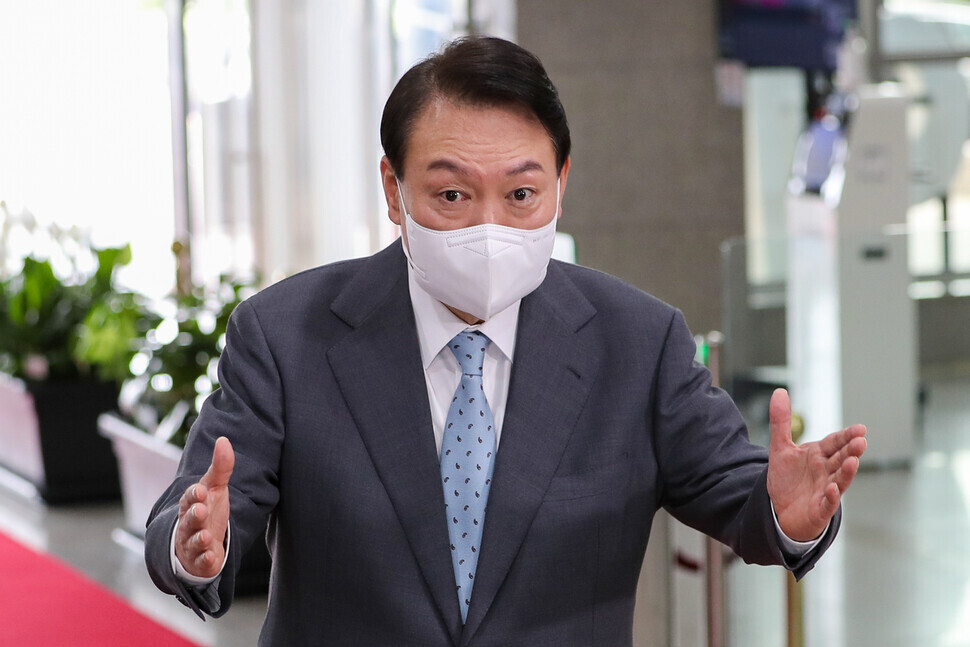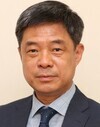hankyoreh
Links to other country sites 다른 나라 사이트 링크
[Column] Dangerous roots of Yoon’s brand of “draining the swamp”


By Baek Ki-chul, executive editor
From the way South Korea’s institutions of power have been acting recently, it looks as though they have kicked off President Yoon Suk-yeol’s new version of a “campaign to eradicate deep-rooted vices,” as we’ve seen with their responses to the 2019 repatriation of North Korean fishers and the 2020 death of a South Korean government employee in the West Sea.
It’s unexpected to see Yoon — a specialist in special investigations during his time as a prosecutor — launching his opening salvo with investigations into alleged “pro-Pyongyang” actions. This may be his way of warming up for the main event to come, but it comes across as both awkward and dangerous.
Both the incidents that have come under scrutiny involve a highly complex set of circumstances that can’t be simply slashed apart like the proverbial Gordian knot. They are unavoidably controversial in political terms — the kinds of cases where it is impossible for any one side to score a total victory.
We see evidence of this in the current tides of public opinion, which stand in stark contrast with the overwhelming support the public showed for the campaigns to eradicate vices early on in the Moon Jae-in administration.
It’s also unusual to see how the investigation has progressed. No sooner had the new administration taken over than the Ministry of Unification and National Intelligence Service started targeting their own previous leaders, blithely unconcerned with how it came across.
This is what happens when you apply a political yardstick to things without concern for the reality of the situation. The nature of these cases is such that the negative public response could end up growing the more indiscriminately the administration pushes.
The context behind these head-scratching investigations with their “pro-Pyongyang” frame is something that could be gleaned from recent remarks by Prime Minister Han Duck-soo. When asked at a Korea News Editors’ Association forum not long ago to sum up the current administration’s guiding approach to governance, he replied, “What the president clearly wants to do is to comprehensively cover things like freedom, democracy, human rights and the rule of law.”
Han also recalled how Yoon had repeatedly mentioned “freedom” and “citizens of the world” in his inaugural address. “When you practice administration, it all comes down to freedom in the end,” he said. “Innovation comes from responsible freedom, and the economy is able to thrive. With that sort of freedom, we can gain recognition by the international community.”
This indicates that the president’s aim is to use freedom as a basis for reestablishing democracy, human rights and the rule of law while boosting the economy and cooperating with the international community. If pressed to characterize this approach, one might describe it as a “liberal South Korea project.”
Yoon’s liberal convictions help give a sense of why this new campaign is unfolding the way it has been.
He seems to think that under his predecessor’s administration, South Korea became a country run according to the logic of the activism of the ’70s and ’80s, closer to socialism and totalitarianism than freedom, while the fundamentals of its state diplomacy were compromised. To him, probes into the two cases serve multiple goals: helping to rectify Korea’s freedom and human rights, punishing past administration figures for capitulating to Pyongyang, and sending a strong signal to North Korea itself.
But is this really how the previous administration was — parting ways with liberalism, human rights, the rule of law, and the alliance with the US in favor of sympathies with the North? It seems impossible to agree with that perspective.
The Moon Jae-in administration was much closer to being a “liberal left” one than any kind of socialism or totalitarianism.
Should an administration be considered “socialist” simply because some of its key figures were former members of the National Council of University Student Representatives, an organization that at one point had certain ideological leanings amid its battles against dictatorship? Were press freedoms eroded during the previous administration? Did it guarantee the prosecutor general’s ability to serve out the entirety of his term, in defiance of the rule of law?
The South Korea-US alliance has suddenly found itself on much better terms in the two months since the Yoon administration took office. Does that also mean that it went south under the Moon administration?
Was the comprehensive strategic alliance agreement by Moon and US President Joe Biden last year just a scrap of paper? Was it “pro-Pyongyang” for the administration to do whatever it could to find avenues toward peace when Donald Trump and Kim Jong-un were locking horns?
The faults of the Moon administration lay in its double standards and incompetence — not in any destruction of liberalism.
The repatriation of the North Korean fishers was more or less a matter of dealing as sensibly as possible with the issue of violent criminals who had killed 16 people. This is not to say we should not be investigating it thoroughly to observe how rigorously the proper procedures were followed.
The same is true for the death of the government employee in the West Sea. There is some room for debate over whether the determination that he was attempting to defect to North Korea was made too rashly. But some of the particulars also relate to sensitive matters of intelligence, which means it is not an area where people should be shooting their mouths off the way they are.
The most important thing to consider is that the South Korean public is not on board with this kind of ideologically framed campaign to “eradicate vices.”
Over the past month or so that he has been focusing on these two cases, Yoon’s approval rating has been in free fall. One might expect it to be the Democratic Party suffering this sort of slide — why has it turned out to be the opposite? The South Korean public is all too aware of the vulnerabilities and ambiguities of the “pro-Pyongyang” frame.
The people in power need to recognize that those sorts of frames just don’t work with the public anymore. It’s true for a lot of issues in general, but South Korea’s politicians don’t seem able to keep up with the public’s horse sense. The people see right through both sides, and the way they tell only half the story while framing everything in self-serving terms.
This sort of staged campaign to combat “vices” on security-related matters might ultimately turn up something that leads to someone or other getting punished. Even then, that’s only a partial success. It’s certainly no way to win the public’s support.
True liberalism is about acknowledging differences of ideas and methods within the larger framework of liberty.
But when people are unable to break out of their long-standing habit of viewing everything through ideological lenses — when they accuse the people they should be engaging in good-faith competition with of being pro-Pyongyang or totalitarians, and when they go so far as to use investigative institutions to punish them and force them out — that is not liberalism in the true sense.
Please direct questions or comments to [english@hani.co.kr]

Editorial・opinion
![[Column] Season 2 of special prosecutor probe may be coming to Korea soon [Column] Season 2 of special prosecutor probe may be coming to Korea soon](https://flexible.img.hani.co.kr/flexible/normal/500/300/imgdb/original/2024/0426/3317141030699447.jpg) [Column] Season 2 of special prosecutor probe may be coming to Korea soon
[Column] Season 2 of special prosecutor probe may be coming to Korea soon![[Column] Park Geun-hye déjà vu in Yoon Suk-yeol [Column] Park Geun-hye déjà vu in Yoon Suk-yeol](https://flexible.img.hani.co.kr/flexible/normal/500/300/imgdb/original/2024/0424/651713945113788.jpg) [Column] Park Geun-hye déjà vu in Yoon Suk-yeol
[Column] Park Geun-hye déjà vu in Yoon Suk-yeol- [Editorial] New weight of N. Korea’s nuclear threats makes dialogue all the more urgent
- [Guest essay] The real reason Korea’s new right wants to dub Rhee a founding father
- [Column] ‘Choson’: Is it time we start referring to N. Korea in its own terms?
- [Editorial] Japan’s rewriting of history with Korea has gone too far
- [Column] The president’s questionable capacity for dialogue
- [Column] Are chaebol firms just pizza pies for families to divvy up as they please?
- [Column] Has Korea, too, crossed the Rubicon on China?
- [Correspondent’s column] In Japan’s alliance with US, echoes of its past alliances with UK
Most viewed articles
- 1AI is catching up with humans at a ‘shocking’ rate
- 2[Column] Season 2 of special prosecutor probe may be coming to Korea soon
- 3‘We must say no’: Seoul defense chief on Korean, USFK involvement in hypothetical Taiwan crisis
- 4Is Japan about to snatch control of Line messenger from Korea’s Naver?
- 5The dream K-drama boyfriend stealing hearts and screens in Japan
- 6Amnesty notes ‘erosion’ of freedom of expression in Korea in annual human rights report
- 7Up-and-coming Indonesian group StarBe spills what it learned during K-pop training in Seoul
- 8[Column] Action on climate change isn’t driving inflation – fossil fuels are
- 9[Column] ‘Choson’: Is it time we start referring to N. Korea in its own terms?
- 10Korea sees more deaths than births for 52nd consecutive month in February